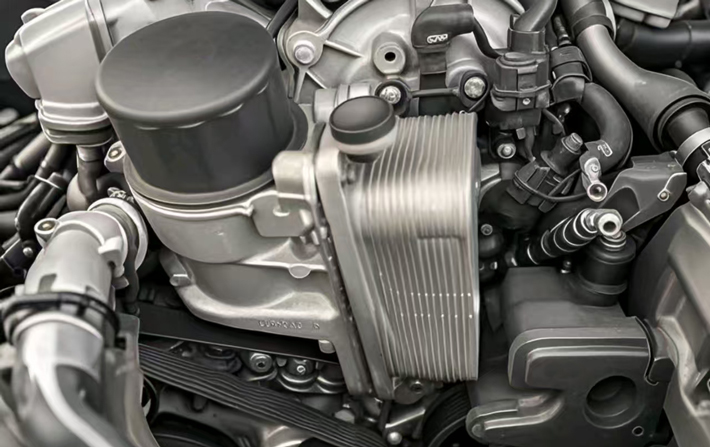Working Principle of Oil Coolers and Strategies to Ensure Equipment Heat Dissipation Efficiency.
2025-05-12
Oil coolers, as critical heat dissipation components in industrial equipment, automotive engines, and power systems, play a central role in maintaining stable equipment operation by controlling oil temperature through efficient heat exchange. This article explores the working principles of oil coolers, analyzes key factors affecting heat dissipation efficiency, and discusses optimization methods to ensure high-performance thermal management.

I. Working Principle of Oil Coolers
An oil cooler is a heat exchange device that operates based on thermal conduction and convective heat transfer. The process involves three stages:
1. Heat Absorption: High-temperature oil, carrying waste heat generated by equipment (e.g., engines or hydraulic systems), flows into the oil cooler through pipelines.
2. Heat Exchange: The core structure of the oil cooler consists of multi-layered fins or honeycomb channels designed to maximize surface area for heat transfer. A cooling medium (air or water) flows over the fins in a counter-current direction, transferring heat from the oil to the cooling medium.
3. Cooling Cycle: The cooled oil is pumped back into the equipment, forming a closed-loop system that continuously regulates temperature.
Oil coolers are categorized into two types based on cooling methods:
Air-Cooled: Relies on airflow for heat dissipation. Simple in design and cost-effective, but efficiency is influenced by ambient temperature.
Water-Cooled: Uses circulating water for higher heat transfer efficiency, ideal for high-power applications, but requires a dedicated water circulation system.
II. Key Measures to Ensure Heat Dissipation Efficiency
To maintain optimal performance under demanding conditions, the following strategies are essential:
1. Optimized Structural Design
Increased Surface Area: Enhance heat exchange efficiency through densely arranged fins, microchannel technology, or 3D structures.
Fluid Dynamics Optimization: Minimize flow resistance and avoid turbulence or stagnant zones. Examples include corrugated fins or partitioned flow guides.
2. High-Thermal-Conductivity Materials
Select materials with high thermal conductivity and corrosion resistance, such as aluminum alloys (lightweight, cost-effective) or copper alloys (superior conductivity).
Advanced nano-coating technologies (e.g., graphene coatings) can further improve surface thermal performance.
3. Precise Oil Flow and Temperature Control
Flow Rate Adjustment: Dynamically regulate oil pump power based on equipment heat output to balance flow rate and cooling demand.
Smart Temperature Management: Integrate temperature sensors and automated valves to monitor oil temperature in real time and adjust cooling medium flow.
4. Regular Maintenance and Cleaning
Prevent Clogging: Remove impurities or oxidized deposits from fins to avoid insulating layers. Perform periodic cleaning and use high-purity oil.
Leakage Checks: Ensure seals are intact to prevent cooling medium leaks (e.g., water in water-cooled systems) or oil contamination.
5. Environmental Adaptability
Air-Cooled Systems: Install dust filters or auxiliary fans in high-temperature or dusty environments to maintain airflow.
Water-Cooled Systems: Use antifreeze in cold climates to prevent pipe damage from frozen coolant.
III. Future Trends
As power density in equipment continues to rise, oil cooler technology is evolving toward high efficiency, intelligence, and integration:
Phase-Change Cooling: Leverage latent heat (e.g., evaporation) for superior heat transfer.
Digital Twin Models: Simulate performance degradation to enable predictive maintenance.
Compact Designs: Utilize 3D printing for lightweight, complex, and efficient heat exchange units.
Summary
Oil coolers are indispensable for thermal management, directly impacting equipment lifespan and energy efficiency. Through scientific design, precise maintenance, and technological innovation, heat dissipation efficiency can be significantly enhanced, ensuring reliable operation of high-performance systems. With advancements in materials and smart control technologies, oil coolers will play an increasingly vital role in the Industry 4.0 era.